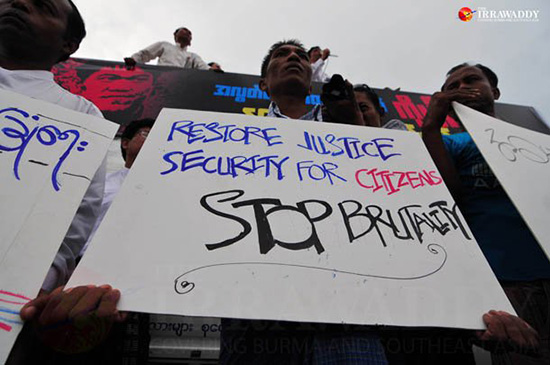
COMMENTARY: News that the Burma Army shot dead journalist Aung Kyaw Naing while in military custody is frightening, and of great concern for every journalist in this country.
From the shocking incident, made public late last month, any reasonable observer can infer that the military still has a licence to commit extrajudicial killings. Indeed, impunity is alive and well in Burma.
Aung Kyaw Naing, also known as Par Gyi, was arrested on September 30 while covering clashes between the Burma Army and ethnic rebels in Kyaikmayaw, Mon State. The news of his disappearance was reported and his wife, Than Dar, said in a press conference on October 21 that he had been in military custody for several weeks and called for his immediate release.
By the time she asked, however, he had already been killed—some 17 days earlier. Thandar, and the media to whom she was speaking, had no idea about the killing and assumed that he was still being held in military custody.
A couple of days after her press conference, the army released a statement saying that a soldier shot and killed Aung Kyaw Naing on October 4 as he attempted to seize the soldier’s gun with the aim of fleeing from his captors.
The two-page statement in the aftermath of Aung Kyaw Naing’s killing was an obvious effort to explain how the army might reasonably kill a journalist.
'Communications captain'
The statement made two main points: firstly, that Aung Kyaw Naing was a “communications captain” for the political wing of the Democratic Karen Benevolent Army (DKBA), implying that he was not a journalist but rather a Karen rebel; and that the “rebel” had tried to seize the gun from a soldier.
Considering those two claims as a reference point, is the army justified in killing Aung Kyaw Naing? Granted, a statement of this kind from the army is unprecedented.
The problem, however, is a growing tide of doubt over its veracity.
Few believe it, due to the military’s consistently poor human rights record. For decades, Burma’s military has been notorious for its human rights violations, whether by cracking down on peaceful demonstrators or launching offensives against ethnic armed groups in which civilians often bear the brunt of casualties.
Adding to suspicions, the army’s statement said that Aung Kyaw Naing’s body was “properly buried” in Shwe War Chong village, about 20 km from Kyaikmayaw. This “proper burial” has all the marks of a cover-up.
Aung Kyaw Naing’s detention, and the handling of his body, raises several “whys”: Why did the army withhold this news for more than two weeks? Why didn’t it let the victim’s family know of his death immediately? Why did it bury his body without informing relevant authorities, such as the local government, police or hospital officials?
While the army’s statement claimed Aung Kyaw Naing was affiliated with the Karen rebel group, reports confirmed that he had contributed news stories and photos to local publications such as Eleven Media, the Yangon Times and The Voice. Prior to his arrest, he had been reporting from an area held by the DKBA, but last week, the DKBA’s political wing, the Klohtoobaw Karen Organization, denied to The Irrawaddy that Aung Kyaw Naing was affiliated with the organisation.
Severe violation
No matter who Aung Kyaw Naing really was—a journalist or a member of the KKO—the army does not have a right to kill him in its custody. This was unequivocally an extrajudicial killing, and a severe human rights violation.
Not since 2007, when the Japanese journalist Kenji Nagai was shot in the streets of Rangoon while covering anti-government protests, has a journalist been killed by the army.
Ironically, news of Aung Kyaw Naing’s killing came a week after President Thein Sein in Italy asked the European Union to cease its scrutiny of Burma’s human rights situation.
An independent investigation into the circumstances of Aung Kyaw Naing’s death is crucial if this “reformist” government is to maintain credibility as such. Thandar has called on the army to return the body and told the media she would press charges against the army for the killing.
On Sunday, nearly 100 people led by prominent activists such as Min Ko Naing staged a demonstration to denounce the killing, calling for an investigation into the incident.
The New York-based Committee to Protect Journalists has also chimed in: “The killing of Aung Kyaw Naing by Burma’s military is reprehensible,” said Shawn Crispin, CPJ’s Southeast Asia representative. “Civilian authorities must investigate the military’s accounting of his death, which has the initial hallmarks of a cover-up. Any soldier found responsible for his extrajudicial killing or mistreatment before his death must be prosecuted to the fullest extent of the law.”
Largely quiet
So far, President Thein Sein’s government has been largely quiet on the killing, with state media printing only the verbatim statement from the army announcing Aung Kyaw Naing’s death. The government’s silence is effectively tacit approval for free rein for the army to commit such crimes in future.
Late last month, there was an initial promising sign, with police in Kyaikmayaw promising to accept a criminal complaint filed by the late journalist’s wife.
Both the government and the military leadership must immediately initiate a proper investigation, with the inclusion of civil society, to show that the Burma Army—long in the sights of human rights defenders—no longer has a licence to kill.
Kyaw Zaw Moe is the editor of English edition of The Irrawaddy magazine. He can be reached at kyawzwa@irrawaddy.org
This work is licensed under a Creative Commons Attribution-NonCommercial 3.0 New Zealand Licence.




